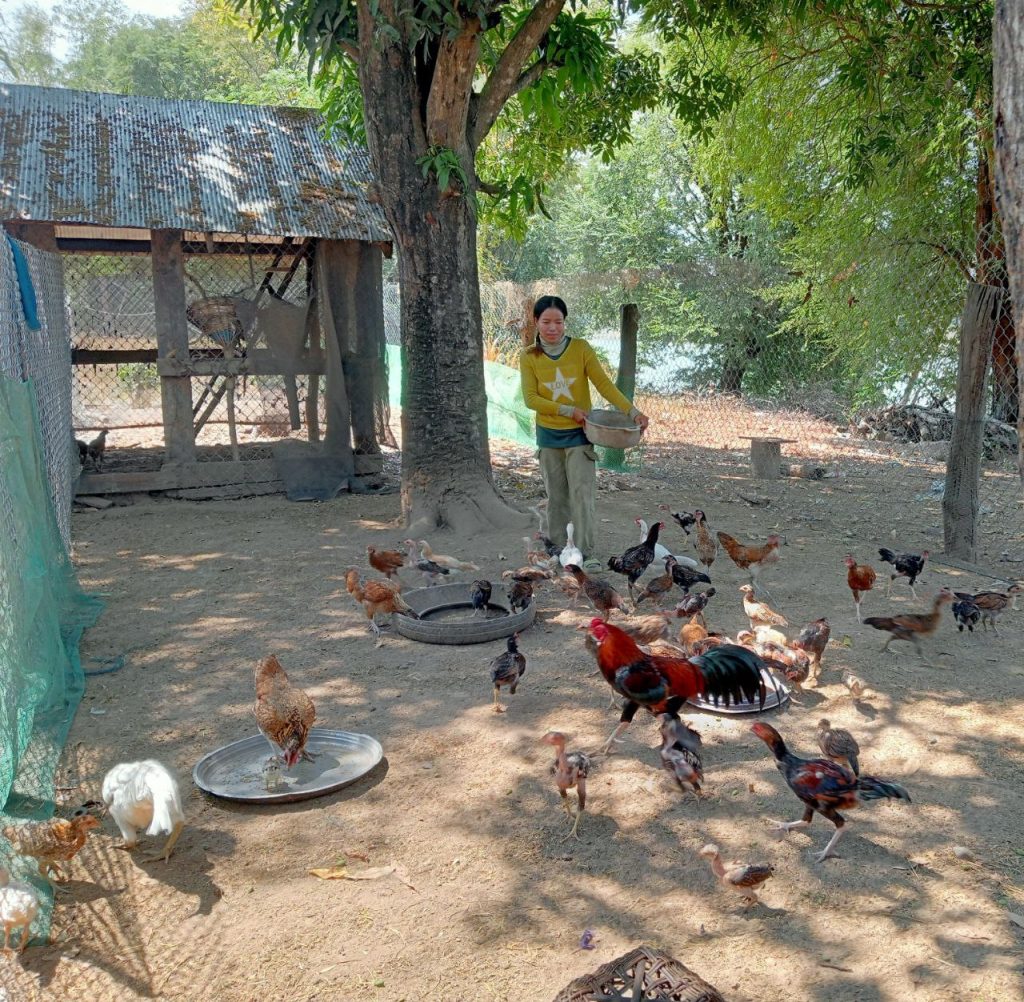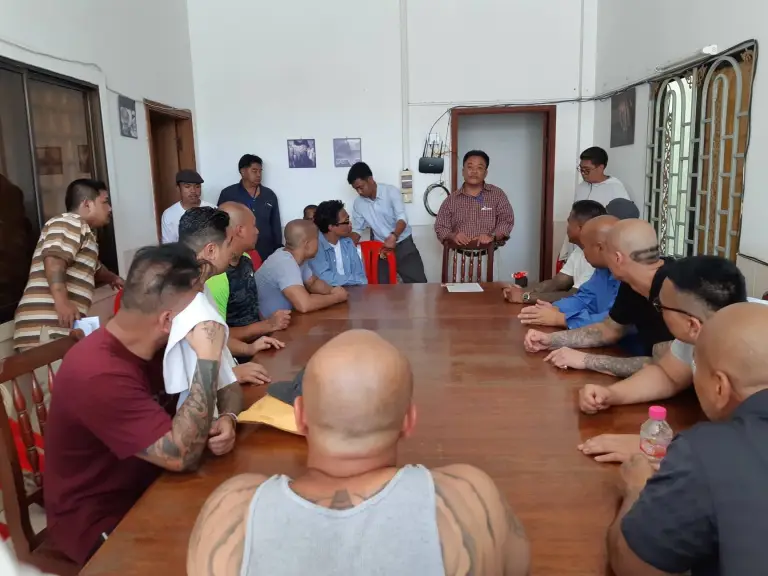A few people have reached out to ask how we have been affected by the US government foreign funding freeze and I thought it was worth writing about here.

First, we were not directly affected. The vast majority of Mennonite Central Committee’s support comes from Anabaptist church bodies and congregations in the US and Canada, including church contributions, individual contributions, thrift stores sales, and relief sales. If you’ve supported MCC in any capacity – from volunteering at a thrift store to organizing my coins counts – thank you.

Our second largest source of funding is from MCC’s account at the Canadian Foodgrains Bank. MCC was one of the original founders of this program that enables Canadian farmers – including many Mennonites – to donate fields of grain to address hunger and poverty around the world. The Canadian government then matches the farmers’ donations at ratios of up to 4:1. Finally, we have the grant from Brot für die Welt that I’ve wrote about before.
MCC does not accept US government funding in Cambodia or Myanmar. To my knowledge we have never applied for it. Our mission is to follow Christ’s example of love and compassion by responding to basic human needs and working for peace and justice. There are times and situations when that mission is incompatible with the political priorities of the day. For instance, during the 1980s MCC was one of only five American NGOs, all of them Christian, that went against an international embargo to witness in Cambodia. Today Mennonite Central Committee seeks to demonstrate God’s love for all people in 45 countries around the world, including in sensitive contexts like North Korea and Cuba. We are a ministry of the church. So – thanks to God, the church, and you – MCC has not had to lay off staff or downsize programs due to the US government foreign funding freeze.
However, the US government foreign funding freeze has directly impacted two of our local partners.

One of our partners had recently been awarded three multi-year USAID grants to implement Climate Change resilient agriculture in vulnerable rural communities. Based on my reading of Chapter 9 of Project 2025, it is very unlikely that this type of Climate Change funding will be restored and the partner has been forced to downsize. This has meant laying off staff, phasing out of communities, and backing out of agreements with the local government.

The other is the program that provides supports to returnees to Cambodia from the United States. These returnees were refugees who travelled to the United States as children, most under the age of three, and who grew up there. For over two decades this program’s only consistent funders have been the US government (first through the US Embassy, later through USAID) and Mennonite Central Committee Cambodia. As I shared in a recent post, this program has been incredibly successful with a high-employment rate and a recidivism rate of 7.5% which, compared to rehabilitation programs in the US, is unheard of. Many of the returnees were able to turn their lives around after hitting rock bottom thanks to the support of this program.
The program had recently been renewed by USAID for another five years and had expanded significantly in order to meet the needs of the mass deportations the US government advised them were coming. The US government foreign funding freeze left the program with an unclear future. They applied for the humanitarian waiver and were denied, despite point 1(c) noting “repatriation of third country nationals to their country of origin or safe-third-country.” As the dates for rent and payroll came closer, the Executive Director made the hard decision to lay off staff and close the larger new center that the program had just moved to near the new Phnom Penh airport. It wouldn’t be the first time that the management team worked unpaid but they couldn’t ask that of the broader team who have families they need to support. Then, shortly before the meeting to lay-off staff, the Cambodian government called the program and told them that the first mass deportation of the year was coming soon. The program was asked to keep the center open and staff employed…without any funding or guarantee that funding would be restored. The Executive Director had been in contact with USAID for updates until their emails and phones abruptly went offline as the vast majority of staff were recalled to the US. Contacts at the US Embassy and US Immigration and Customs Enforcement were supportive but had no clear answers as to what was happening, if funding would be restored, or what restored funding would look like. The US Embassy did assist them with re-applying for the humanitarian waiver but there’s been no response. The Executive Director shared a plan with me to scale-down the program to provide care to the highest needs individuals and shifting to a low-cost drop in center model, but even then he didn’t know if the program should start that transition now, hold off for the impeding mass deportation, or hold out for funding to be restored. Should the program let go of it’s experienced staff so that they could look for other work in a job market suddenly flooded by NGO workers? Should the program close the center and housing facility just as a mass deportation is about to arrive? There are more unknowns than knowns. It is an incredibly difficult situation to make decisions in.
Fortunately, this month MCC was able to provide the program with emergency gap funding to keep the program’s staff employed and the center open. However, our ability to step in is limited and our funding alone can’t sustain the program at it’s current scale. Especially with the threat of a trade war between the US and Canada. Remember that the vast majority of MCC’s funding comes from churches in the US and Canada. Any economic turmoil between the two countries has a heavy impact on our budget. So we are faced with a situation where MCC’s ability to respond is limited just as needs around the work are spiking. Still – prayers of gratitude and praise have been pouring from my lips that we were able to pull together the funds to provide emergency gap funding to the returnee program during the tariff “pause”.
Beyond our partners, we’ve seen international and local organizations furloughing or laying off entire teams and shutting down programs. USAID families are packing up and leaving Phnom Penh on recall orders from the US government. They’re leaving not just work, but also church and school. The international church that Crystal attends has seen many sudden departures. These people are returning home to the US where they face uncertain employment and housing. Some spouses of USAID staff have had to quit their own work, studies, or volunteering in order to obey the recall order. Laid off professionals – Cambodian and foreigner – have flooded the job market here.
The US has also by far been the largest contributor to UN funding and the freeze has also had an impact on UN Programs as well. A few years ago, shortly after the coup, we organized a training for a peacebuilding partner in Myanmar on best practices for administering humanitarian aid in conflict zones and on the humanitarian core principles. This partner then developed these learnings into a course and then trained other local groups, including one of our church partners. Because of this training, this church partner was approved by the UN to deliver large batches of UN humanitarian aid to conflict zones because they were the only group in the area that understood the principles and requirements. All that to say, we’re watching to see if those UN humanitarian aid shipments are disrupted due to the funding freeze.
A few days after the funding freeze went into effect the Cambodian Ministry of Education announced that a set of nationwide outstanding student exams were being suspended. This surprised a lot of people in Cambodia. It’s being speculated that this was related to the US government funding freeze and that Ministry had to reallocate it’s budget to cover shortfalls. This has been the most obvious sign that Cambodian government programs have also been affected but we don’t know the full impact in other parts of the government.
Thank you for updating us on the situation in Cambodia. Please stay safe. It’s 2025 for pete’s sake, one would have thought by now we could all live peaceful and harmonious lives on the whole planet, with housing and plenty of food for everyone.
Glad mcc is not impacted, but oh so sad about other ngos. We need to up our giving to you so that mcc can help fill the gaps!
Thank you for this informative report! So thankful for MCCs work!
Thanks for holding forth during these days of chaos and uncertainty at home and abroad… and for your stories not only of the negative implications but also the positive way you and MCC are making a difference! May God fill you with strength and peace and as the old hymn says, “grant us wisdom, grant us courage for the living of these days.”
There is so much to pray for ! Thankful for your caring heart and capable hands to help address the problems with so many others in your faith community. Please stay safe in all of these efforts. We are praying for all of you ❤️🙏
Thanks, Charles, for reporting on how funding cuts are impacting MCC’s partners. While MCC may be able to continue its work because of the generosity of individuals and churches, partners are experiencing real and lasting consequences. It, I am sure, is difficult for you to see staff and programs you know are having a positive impact stopped, harming all concerned. Stay strong.